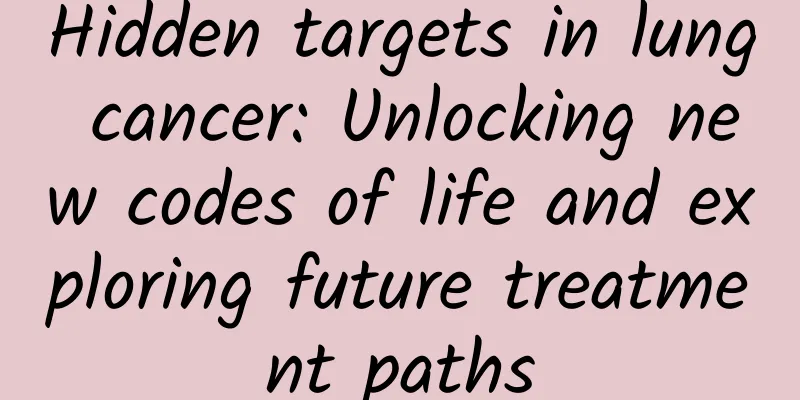Hidden targets in lung cancer: Unlocking new codes of life and exploring future treatment paths

|
In the vast field of medicine, lung cancer has always attracted the attention of researchers with its high morbidity and mortality. With the rapid development of medical technology, people have gradually realized that lung cancer is not a single disease, but a complex process in which multiple factors, multiple genes and signal pathways work together. In this process, hidden targets have become the key starting point for exploring new strategies for lung cancer treatment. So, what are the hidden targets of lung cancer? How much do you know about them? Simply put, hidden targets are specific genes, proteins or signaling pathways in lung cancer cells that have not yet been fully understood or utilized (equivalent to the "information highway" in the human body). These targets may play a vital role in the occurrence and development of lung cancer. Therefore, finding and studying these hidden targets is expected to open up new paths for lung cancer treatment. Do you know what lung cancer targets have been discovered so far? In the past few decades, through the efforts of scientific researchers, some common targets of lung cancer have been discovered, such as EGFR (epidermal growth factor receptor), ALK (anaplastic lymphoma kinase), etc. In layman's terms, we can imagine EGFR as the "accelerator" of the cell. When it works normally, the cell will run smoothly, and when it malfunctions, the cell may "overspeed" or even "lose control" and become a cancer cell; ALK is like a "bad part" in the cell. When it has problems, the cell cannot function normally, which may lead to the occurrence of cancer. The discovery of these targets provides strong support for the precision treatment of lung cancer. The development of drugs targeting these targets has significantly extended the survival of many lung cancer patients and significantly improved their quality of life. However, although researchers have achieved some results, the complexity and diversity of lung cancer determine that there are still many hidden targets waiting to be discovered. These hidden targets may exist in specific areas of lung cancer cells, or they may be closely related to certain specific signaling pathways. Therefore, we need to continue to explore in depth in order to find more effective therapeutic targets. So why do we need to continue looking for hidden targets? Lung cancer is a highly heterogeneous disease with a very complex pathogenesis and progression. Although existing treatments have achieved certain therapeutic effects, they still have many limitations. For example, some patients may develop drug resistance or poor treatment effects after using drugs targeting known targets. In addition, the recurrence and metastasis of lung cancer are also great challenges in current treatment. Therefore, we need to continue to search for hidden targets in order to find new treatment strategies. Only by in-depth research on these hidden targets can we have a more comprehensive understanding of the pathogenesis and progression of lung cancer, and provide a theoretical basis for the development of new drugs and treatments. At the same time, through treatment targeting these hidden targets, the treatment effect of lung cancer can be improved, the risk of recurrence and metastasis can be reduced, and patients can have a better survival prognosis. So how do we find these hidden targets? Finding hidden targets is a complex and arduous task. You must know that it requires the use of advanced scientific and technological means and increased cooperation with other departments. At present, researchers mainly use the following ways to find hidden targets for lung cancer: First, the continuous development of gene sequencing technology provides us with more accurate information about the lung cancer genome. By comparing and analyzing the genetic differences between normal cells and lung cancer cells, we can find those gene mutations that are closely related to the occurrence and development of lung cancer. These gene mutations may be potential hidden targets. Secondly, proteomics technology can help us study the expression and interaction of proteins in lung cancer cells. By comparing the differences in the proteomes between normal cells and lung cancer cells, we can find protein molecules that are closely related to lung cancer. These protein molecules may serve as new therapeutic targets and provide new ideas for the treatment of lung cancer. In addition, immunohistochemistry is also an important means of finding hidden targets. It mainly studies the immune characteristics and responses of lung cancer cells to discover molecular markers related to immune escape, drug resistance, etc. These molecular markers may become new immunotherapy targets and provide new strategies for immunotherapy of lung cancer. Do you know what challenges you may face in the process of searching for hidden targets? Despite the continuous advancement of scientific and technological means, there are still many challenges in finding hidden targets. First, the pathogenesis of lung cancer is very complex, involving the interaction of multiple genes and multiple signaling pathways. This makes it difficult to treat a single gene or protein, and requires comprehensive consideration of multiple factors. Secondly, even if potential hidden targets are found, a large number of experiments are still needed for verification and clinical trials. These processes not only take up a lot of time and resources, but also have the risk of failure. Therefore, it is necessary to establish a more efficient and accurate verification and testing system to improve the success rate of finding hidden targets. In addition, as the research goes deeper, we also need to pay attention to the individual differences and heterogeneity of lung cancer. Lung cancer cells from different patients may have different gene mutations and expression patterns, so personalized treatment plans need to be developed for different patients. This requires that while looking for hidden targets, we must also pay attention to the individual differences and genetic background of patients. Future prospects for hidden targets in lung cancer In summary, the discovery and research of hidden targets in lung cancer is a hot topic and difficulty in the field of lung cancer treatment. In this era full of challenges and opportunities, we need to continue to invest more resources and energy to strengthen the research and exploration of hidden targets in lung cancer. By deeply exploring the pathogenesis of lung cancer, combining advanced scientific and technological means, strengthening interdisciplinary cooperation, and promoting the cross-integration of multiple fields such as medicine, biology, and pharmacy, it is expected to find more effective therapeutic targets. The discovery of these hidden targets will bring new treatment options and hope to lung cancer patients. At the same time, everyone also needs to recognize the importance of prevention and early diagnosis in lung cancer control. By changing bad living habits, strengthening environmental protection, and promoting screening programs, the incidence of lung cancer can be reduced at the source, and strong support can be provided for early detection and treatment. Looking to the future, with the continuous advancement of medical technology and in-depth research, we should have reason to believe that the discovery and use of hidden targets in lung cancer will bring revolutionary breakthroughs in lung cancer treatment. By accurately identifying and treating these targets, doctors can provide lung cancer patients with more effective and safer treatment options, further prolonging their survival and improving their quality of life. In addition, we also need to jointly promote the development and progress of lung cancer treatment. Only in this way can we bring better treatment effects and survival prognosis to lung cancer patients and make greater contributions to human health. Expert introduction Zhang Yalei Deputy Chief Physician, Department of Thoracic Surgery, The First Affiliated Hospital of Guangzhou Medical University Member of the Tobacco Control and Lung Cancer Prevention and Control Professional Committee of the China Tobacco Control Association Member of the Chinese Anti-Cancer Association Clinical Oncology Collaborative Committee (CSCO) Member of the Molecular Targeted Therapy Professional Committee of Guangzhou Anti-Cancer Association Standing Committee Member of the Lung Cancer Branch of Guangdong Precision Medicine Application Society Member of the Standing Committee of the Tumor Emergency and Critical Care Committee of the Guangdong Chest Disease Society Member of the Oncology Committee of Guangdong Health Association Member of the Southern Bone Protection Alliance Approval code TML0021575-54485, valid until 2025-04-18, expired information will be deemed invalid |
>>: Summer delicacy top trend causes "Haff disease"? Crayfish says: I won't take the blame!
Recommend
What are the benefits of eating pork liver during menstruation?
Women during menstruation not only have low physi...
What should you pay attention to before inducing labor?
Such things often happen in life. Some people, af...
How to treat the second degree cervical erosion best
Second degree cervical erosion is a very common c...
Postoperative care for uterine fibroids
When there is a problem with the body, we must ma...
Can I get pregnant if I have patent ductus arteriosus?
Patent ductus arteriosus means that the child'...
The harm of low skeletal muscle in girls
From a clinical medical point of view, skeletal m...
"Food Truth" Series | Will eating persimmons cause kidney stones? Count the rumors related to persimmons
As soon as autumn arrives, sweet, soft and juicy ...
Bleeding with blood clots during pregnancy
Pregnancy is a very important thing for women. It...
What to do if you don't get your period when you're not pregnant
Menstruation is very important for every woman. I...
What are the white blood cells in vaginal discharge?
Leukocytes in vaginal secretions is a disease tha...
Why do we add onions when steaming fish? What is the function of putting onions under steamed fish?
We all know that there are many ways to eat fish,...
What is the nutritional value of hamburgers? How to make hamburgers
Hamburgers are convenient, delicious, and nutriti...
Precautions after hysteroscopic curettage
Important reminder: Diagnostic curettage with hys...









